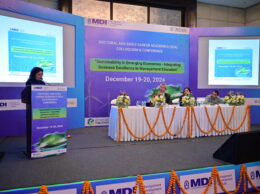Mumbai, 4th May 2018: “The goal is to turn data into information, and information into insight.” Carly Fiorina, Former CEO of HP. The world will create 180 zettabytes of data by 2025, up from less than 10 zettabytes in 2015. The analytics market is expected to surpass $200 billion. This momentous growth of data is ushering in a fourth industrial revolution – Digital Business Transformation. Whether it is determining credit risk, developing new medicines, finding more efficient ways to deliver products and services, preventing fraud, uncovering cyber threats or retaining the most valuable customers, analytics can help to understand the organization – and the world around it.
According to Gartner’s list of the top strategic trends for 2018, Business Intelligence and analytics have appeared as top priority. Previously, it was always thought that Business analytics is something that happens hand-in-hand with the operational functions of a business. As an example, cars are manufactured in India, and are shipped all across the world to be sold to the most suitable customers. This entire cycle creates a lot of data from which crucial insights can be attained, which in turn help to better or refine the processes in the future and also to keep track of the various steps involved. The same cycle takes place even today, but what has changed now is the way one looks at the acquired data. This new way, is the digital way. This same global supply chain is accomplished today, using data-driven technology solutions, which are quicker, intelligent, and flexible to changes.
Now, these data-driven technology decisions are taken on the go, using analytics. Analytics can help create personalized responses to the customers based on their needs. Machine learning when paired with business analytics means the processes can update itself. This side steps the whole sales-funnel concept that was so popular traditionally.
However, just owning analytics tools is not enough. Extracting value from the analytics investment requires professionals and leaders who can read the stories behind the humungous amount of data available and convert this flat boring data into hard hitting and penetrating business strategies.
The Analytics/ Data Science/ Big Data industry in India is currently estimated to be $2.03 Billion annually in revenues, growing at a healthy rate of 23.8% CAGR, making India one of the Top 10 countries in the world, based on revenue from analytics.
Of the annual inflow to analytics industry – almost 12% can be attributed to Advanced Analytics/ Predictive Modelling and Data Science.
The Analytics Industry in India is expected to almost double by 2020. India is basically known for being the base for the analytics export to countries like USA, UK and the whole of Europe. Companies like Mu Sigma, Fractal Analytics, Global Analytics, Manthan are making their presence felt across the globe and are providing state-of-the-art service in the business analytics space. These companies are always looking for business analytics professionals to fill the analytics role giving an exposure to Big Data Management, Data Visualization, Predictive Analytics, etc.
For the last several years, it has been forecasted that the demand for business analytics professionals will far surpass the supply, but this has become a reality in the last four years. As businesses in India, with the world, move away from ‘gut-feel’ based decisions to data-driven-decisions, the scope for a career in Business Analytics, is the career most demanded for.
Keeping these exact thoughts in mind, N. L. Dalmia Centre for Excellence, Mumbai has collaborated with the Virginia Tech, USA to bring the most holistic and contemporary certificate program to India.
Tarun Sen, Professor Emeritus of accounting and information systems and Managing Director of the Virginia Tech, India, Postgraduate Program in Business Analytics, said, “Virginia Tech was one of the first universities to develop an integrated, multidisciplinary program in Business Analytics.” “What’s more, the fact that this is a certificate, not a degree, gives us greater flexibility in collaborating closely with industry. This is a highly applied program,” he added.
Raja Roy Choudhury, Director of the institute in Mumbai, also pointed that the way to advance in the business analytics domain is to transform oneself to become innovative thinkers and provide effective solutions that benefit the organisation. This Virginia Tech Post Graduate Certificate in Business Analytics positions the aspirant for this transformation and not just thinks for the business but also entrepreneurially. The program helps the aspirant to identify the utility in data so that one can affect customer experience, diagnose problems, impact the bottom line, acquire customers using sophisticated technologies like MySQL, R, Python, BI tools, Scrum, AWS, Neural Networks, Genetic Algorithms, Deep Learning, Mongo DB, OWASP, NVIDIA Analytics, etc.
This partnership between Virginia Tech, USA and N. L. Dalmia Centre for Excellence is envisioned to bring about the rift between the number of data driven managers, with the an ability to use analytics to make decisions.









